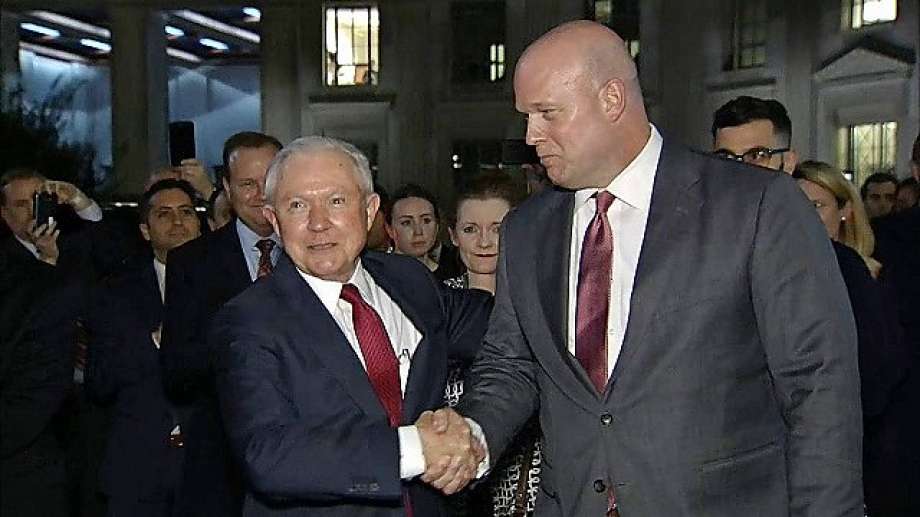
Former Alabama Senator and Attorney General Jeff Sessions with now acting Attorney General Matt Whitaker: Bing
By Glynn Wilson –
President Trump’s appointment of political loyalist Matt Whitaker as acting attorney general to replace Jeff Sessions of Alabama was illegal and is unconstitutional, and a federal judge in Maryland has been asked to rule on that question in a lawsuit defending a the pre-existing condition provision in the Affordable Care Act, a.k.a. Obamacare.
Maryland Attorney General Brian E. Frosh filed a motion in federal court on Tuesday challenging the appointment of Matthew G. Whitaker as acting attorney general in the state’s lawsuit, Maryland v. U.S. et al.. The case seeks to uphold the Affordable Care Act’s protection of people with preexisting conditions and other key provisions of Obamacare.
While the Republicans in Congress tried and failed last year to pass legislation to repeal and replace the law, since the election of Donald J. Trump as president the administration has taken executive actions to try to kill it, one tiny paper cut at a time.
In the court filing, Frosh outlines why Whitaker’s appointment is unconstitutional and argues why he should be replaced by Deputy Attorney General Rod J. Rosenstein, who was confirmed by the Senate, while Trump seems to have no plan to submit Whitaker’s name for confirmation while he supposedly interviews other permanent replacement candidates, including Senator Lindsey Graham of South Carolina.
Frosh is asking the court to declare Rosenstein as acting attorney general and to recognize his authority to represent the United States government in the healthcare case.
“The Constitution and Congress have established vitally important processes for filling high-level vacancies in the federal government,” Frosh said in a statement about the motion.
“Few positions are more critical than that of U.S. Attorney General, an office that wields enormous enforcement power and authority over the lives of all Americans,” he said. “President Trump’s brazen attempt to flout the law and Constitution in bypassing Deputy U.S. Attorney General Rosenstein in favor of a partisan and unqualified staffer cannot stand.”
The appointment of Whitaker violates the Constitution’s Appointments Clause that requires “principal” senior officials, like the attorney general, to be confirmed by the Senate, Frosh argues. Representing the state of Maryland, he also contends it violates a federal statute that gives authority to the deputy attorney general when the top job is vacant.
“Who the attorney general is is at the core of this lawsuit,” Frosh said in interviews. “Aside from the constitutional issue, this guy, Mr. Whitaker, has extreme views and that’s dangerous in itself.”
The Trump Justice Department has not commented on the motion yet, but administration officials have defended it as legal under the Vacancies Reform Act, including White House spokeswoman Mercedes Schlapp on Fox News.
The president picked Whitaker to serve as acting attorney general last week after forcing Alabama’s Jeff Sessions to resign. Whitaker served as Sessions’s chief of staff, and now it is assumed that, unless he is forced to recuse himself as Sessions did, he will take charge of special counsel Robert Mueller’s investigation into Russian interference in the 2016 election.
Any action Whitaker takes in the healthcare case on behalf of the federal government would be invalid, Frosh said, since Whitaker should not be serving as acting attorney general in the first place under federal law.
Prepared jointly with the private law firm Goldstein and Russell, the motion asks U.S. District Judge Ellen L. Hollander to issue an injunction to replace Whitaker with Rosenstein.
“It is troubling, to say the least, that the president is attempting to fill a ‘vacancy’ he created himself with a ‘temporary’ appointment that might last for many months or years,” according to the motion. “It is especially troubling that the temporary appointee has not been confirmed by the Senate for his underlying position; the President might reasonably be seen as appointing a loyalist in a way that deliberately circumvents the Senate’s constitutional advice-and-consent role.”













